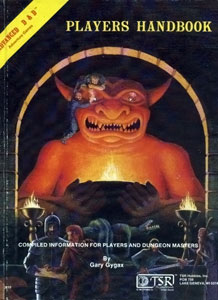Valdus says:
Has my game (which has not started) been coup d'tated by an AD&D game?
Nope. Your mentioning Basic and 80 Modlvay got me thinking about classic AD&D.
Valdus says:
Ezeriah, I never saw D&D and AD&D as basic and advanced as far as skill. Like graduation or something. AD&D is just much much more crunchy, and as I evolved in my rpg I found myself pulled towards gaming that made me rely less on the book.
It's not about skill, or like graduation, even though the designers, imo, created all of those boxed sets beyond basic and expert as a money grab, because in the end, AD&D was meant to be the 'final' tier of the game (no doubt there are plenty of gamers who progressed on the path from Basic to AD&D, viewing Basic as the beginner game). The naming of the sets even lends itself toward a marketing intention of getting the gamer to 'graduate' to AD&D (FFG does the same things with their Star Wars 'Beginner' games).
And I'm not sure how AD&D is so 'crunchy'. Remember,
everything in AD&D is a
guideline, hence the Dungeon Master's
Guide. The preface of the DMG goes on and on for an entire page about how the DM should consider everything within the DMG as guidelines, and use and change whatever he sees fit.
I guess what I'm getting at is this: When the DM gets to that situation where there's an issue that needs to be resolved, like diseases, poisons, psionics, creating a sentient enchanted weapon, whatever said DM
chooses to include in the game, there's a well made mechanic there for them to use if they see fit to do so. And, personally, I like to let the dice help decide how things turn out. It adds another level of fun to the game (e.g., "look, man, I didn't just decide to kill Borg off... you caught that disease in the swamps after the fight, and the group just couldn't afford the cleric").
The things is, without the dice and the mechanics provided by AD&D, I would feel to arbitrary as a DM just repeatedly deciding what happens to the characters.Having a reference with some well thought out mechanics designed around reasonable odds is nice; combined with some experience, an index, and a DM screen, and you're set. In sum, it's nice to have a great set of
guidelines to use.
But again, to each their own. If simpler is your cup of tea, go with it. I'm only here because all that talk about '80 Moldvay got me thinking about '79 AD&D. And, honestly, I thought you guys might actually come to a point where Basic left you hanging too.



